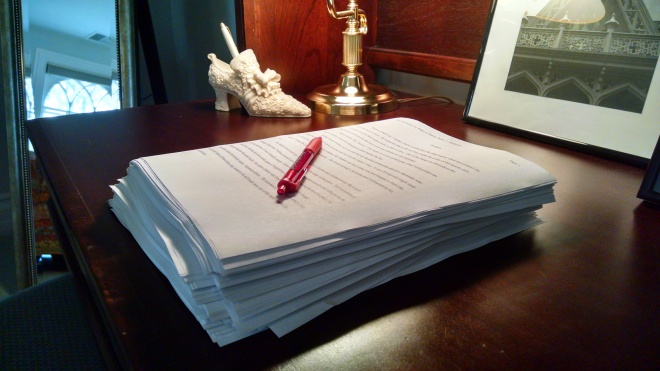I just finished the first draft of The CEO Antes Up. It’s the first book in my new Wager of Hearts series, and it’s due at my publisher on November 14th. In the old days, I would type “THE END” in all caps with a great flourish and go out for a celebratory drink with my husband. But those good old days are over.
Why?
Because I know that typing those two words is really only the beginning. I just printed out the entire 5,000-word-too-long manuscript (and feel guilty about all the dead trees that required).
Now I’ll pick up my red pen and read through it, evaluating emotion, dialogue, stage directions, conflict, character development and plot arc, to name just a few elements. I’ll mark the problems and scribble possible fixes in the margins.
***********************************************************************
“Don’t look back until you’ve written an entire draft; just begin each day from the last sentence you wrote the preceding day. This prevents those cringing feelings, and means that you have a substantial body of work before you get down to the real work which is all in the edit.”
— Will Self
***********************************************************************
I’ll also incorporate the suggestions my critique partners have made about all the same things in the chapters they have read. All too few chapters, alas, because the deadlines just keep rolling in.
Next I’ll sit at my computer and comb through 40 pages a day, working in all the fixes, as well as correcting typos, misspellings, awkward sentence structures, repetitive word use, and bad punctuation. I know 40 pages doesn’t sound like a lot, but believe me, it’s an all-day affair and my brain will be fried by the time I go to bed each night.
****************************************
“In writing, you must kill all your darlings.”
—William Faulkner
****************************************
Then, probably at about 11:55 p.m. on November 14th, I will write an email to my editor with the revised manuscript attached and reluctantly hit “send”.
“But you should be thrilled to hit ‘send’,” you say.
Never! Because I know the book could be better if I just had a few more days—or weeks—to work on it. The only reason I can bring myself to let go of it is the knowledge that I still have the cycle of developmental edits, copyedits, and proofreading to allow me to keep on polishing and improving my work.
***********************************************************************
“Put down everything that comes into your head and then you’re a writer. But an author is one who can judge his own stuff’s worth, without pity, and destroy most of it.”
— Colette
***********************************************************************
I owe my readers the best book I can write. Finishing that first draft is only the foundation of a great read. I still have to add the gleaming woodwork, the arched windows, the crystal chandeliers, and the comfortable, inviting furniture. That’s when a reader will want to live in my book.
Now I’m off to get my red pen. It’s time to start the real work.


Good luck! I know the finished novel will be fabulous. 🙂
Many thanks, Roni! I’m reading it through now, and finding it not too bad. 🙂 I think my wonderful readers will like it too.
Best of Luck! We are all waiting eagerly. 🙂
Thanks, Marintha. It’s quite different from my Whisper Horse novels in location and theme, but I think you will like it. It’s still me writing the book, and I can’t change my voice all that much. It’s a blessing and a curse, I guess. 🙂
Looking forward to your next books! When will we get our little hands or kindle? Sounds funny that a book is now emailed and no pages to an editor. Lol
Ellen, I had to send the first book I ever wrote in giant boxes of paper to editors and agents. It’s wonderful to use email instead. It saves a lot of trees, a lot of postage, and a lot of time. And the “track changes” function is nothing short of genius. Love the digital age! As for a publication date for the new book, I think it will be Sept. 2015, but that’s not definite yet.
Thanks for all your support!